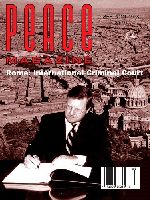
Peace Magazine Sept-Oct 1998, page 31. Some rights reserved.
Search for other articles by PMag staff here
Israel has removed the last remaining obstacle to starting talks on a proposed new treaty that would prohibit the production of material needed for making nuclear weapons.
The U.N. Conference on Disarmament (CD) in Geneva agreed to convene an ad hoc committee that will negotiate a Fissile Material Cutoff Treaty (FMCT), an agreement that would prohibit the production of plutonium and highly-enriched uranium. Israel's decision was vital because the CD operates by consensus, thus permitting any of its 61 member states to impede progress.
Negotiations on the treaty's text should begin later this year after a chairman is selected, but progress is likely to be slow. Nevertheless, the decision to proceed is a step forward in the process, which has been stalled since 1995. The talks will be based on a 1995 mandate that calls for the negotiation of a "non-discriminatory, multilateral and internationally effectively verifiable treaty banning the production of fissile material for nuclear weapons or other nuclear explosive devices."
Differences between the potential signatories, however, could drag negotiations on for years. The nuclear weapon states [United States, Russia, U.K., France and China, as well as Israel, Pakistan, and India want the treaty to cover only the future production of nuclear material and not address existing fissile material stockpiles. A group of 21 non-aligned developing countries, in addition to Japan and Australia, however, want the FMCT to cover not only the future production of fissile material but also existing stockpiles.
The progress on a FMCT was made possible by a change in the positions of Israel, Pakistan, and India, all of whom are believed to have fissile material stockpiles. India was the first of these states to withdraw its objections to the talks, changing its stance immediately following New Delhi's conducting flu-clear tests in May 1998. India withdrew a previous condition that negotiation of a FMCT must be linked to similar talks on achieving nuclear disarmament in a time-bound framework.
Pakistan followed suit this summer following talks between U.S. Deputy Secretary of State Strobe Talbott and Pakistani officials. Islamabad hopes that such cooperation will entice the United States to lift sanctions imposed after Islamabad conduct nuclear tests in May 1998. Pakistan has qualified its stance, however, saying that it wants "a solution to the problems of unequal stockpiles," refer-ring to India's larger stockpile of fissile material.
The United States and other Western powers were quick to seize the momentum caused by the change in India and Pakistan's positions. The United States reportedly applied pressure on Israel to withdraw its objections to beginning negotiations.
Although Israel consented to the talks, Israeli Prime Minister Netanyahu qualified the support, saying that his country has "fundamental problems with the treaty." Israel has maintained a policy, of ambiguity regarding its nuclear weapons capabilities and is not likely to sign an agreement that could compromise that policy.
by Andrew Koch, Senior Research Analyst, Center for Defense InformationThe U.S. Campaign to Free Mordechai Vanunu now has a web site, which you can find at www.nonviolence.org/vanunu
On July 21, the U.S. Department of Energy (D.O.E.) agreed to a $6.9 billion deal with a British company to begin converting the equivalent of 2,800 railroad cars of radioactive waste into glass at the Hanford Nuclear Reservation in Washington.
The contract to start converting the radioactive waste into glass for storage, a process called vitrification, now goes to Congress for approval. Congress now has 30 days to accept or reject the agreement. The contract would signify one of the biggest public works projects in history. Hanford intends to convert 54 million gallons of waste, now buried in 177 underground tanks, into glass for storage, a process that could take 30 years and cost $40 to $50 billion. The D.O.E. maintains that this process will put the waste in a form which will provide long-lasting protection of the Columbia River. This project will only treat 10 percent of Hanford's waste in the next 20 years. This will leave 10 years to vitrify the remaining (90 percent) of the waste by the 2028 deadline.... At least 67 of Hanford's tanks are known or suspected to be leaking, and Washington officials have become impatient with clean-up delays. The tri-party agreement, a court-sanctioned 1989 pact for cleanup, requires Hanford to begin processing low-level tank waste by December, 2003.
Nuclear Age Peace Foundation

Peace Magazine Sept-Oct 1998, page 31. Some rights reserved.
Search for other articles by PMag staff here